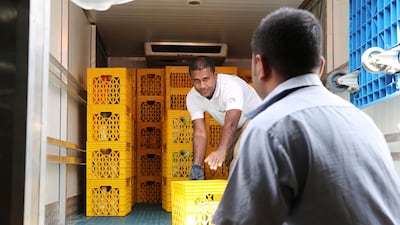Related: UAE charity and fundraising explained: What are the rules?
Free food handouts and social media appeals by members of the public have been prohibited as the government tightens regulations on charitable activities.
A law was unveiled on Thursday that set out the penalties for fundraising, donations and handouts without approval from a licensed charity.
Officials stressed that they want to allow a mechanism for charitable work, but tackle illegal fundraising and misuse of food or goods that are given in good faith.
The country already has strict rules on fundraising.
Ministry of Community Development
This legislation further toughens that. Charity appeals should be left to organisations on an approved list. Members of the public wishing to carry out charity work would need to team up with a licensed charity.
Hessa Tahlak, assistant undersecretary at the Ministry of Community Development, said the new law prohibits members of the public from making social media appeals for fundraising of any kind, including food items and medicines.
However, she said a person can privately collect funds or items from “trusted people” and donate it to a person they know.
“I noticed that people are collecting items from people on social media, some people use WhatsApp groups and they just randomly send everyone a broadcast. That is something that will be questioned,” she told The National.
“Tracking items that are being donated and the person carrying out the donations is very important. This protects the donors. We want to tell people that if you don't know where these items are going, whether it's cash or items, don't take the risk.
“Because it is something that you don't know where it's going to go, you might be questioned and in trouble.”
Illegal fundraising could lead to fines of between Dh200,000 and Dh500,000 ($54,450-$136,128), depending on the nature of the offence, and an unspecified period of time in jail. In 2015, the country introduced strict rules on fundraising amid concerns donations could be used for terrorism or crime.

Ms Tahlak said there have been instances where a person collecting grocery and food items on messaging groups was selling the goods on, instead of them donating them.
In addition, there are instances of elderly people in particular being duped by scammers who were pretending to be in distressed situations and sending out broadcast messages on WhatsApp, asking for donations.
“Older people become emotionally affected by stories like 'my child is suffering' and they immediately transfer the amount because they believe this person,” she said.
“If the donation request is not coming from an authorised entity, don't do it.”
In October, when the ministry first said new legislation was in the pipeline, it said tough laws were needed to meet international standards on countering money laundering, terrorism financing and weapons proliferation.
Even listed charities “are not allowed to publish, broadcast or promote any promotional materials or advertisements for fundraising” without the approval of the relevant authority covering that area.
Under the new rules, residents must be careful they are not breaking the law with donations to groups such as pet charities and cat and dog homes. Any fundraising would need to be linked to a listed charity.
'We don't want to stop people giving'
Officials said they wish charity work to continue and that the regulations will ensure funds or goods reach the proper beneficiaries.
Ms Tahlak insisted the new law was not to deter people from participating in good causes but to ensure the act of fundraising and charity was more regulated.
“We love giving. It's in the culture of the people who live in this country that they love giving and we don't want to stop that but we do want to protect them,” she said.
'We want to make sure that this money from you is given to the right person and for the right purpose.”
A person or group wishing to run a charity appeal should contact their local authority, such as the Community Development Authority.
Licensed charity organisations in UAE:
— Khalifa bin Zayed Al Nahyan Foundation
— Zayed bin Sultan Al Nahyan Charitable and Humanitarian Foundation
— Emirates Red Crescent
— Al Maktoum Foundation
— Mohammed bin Rashid Al Maktoum Humanitarian and Charitable Establishment
— UAE Water Aid
— Noor Dubai
— Dubai Cares
— Al Jalila Foundation
— Dar Al Ber Society
— Beit Al Khair Society
— Dubai Charity Association
— Sharjah Charity International
— Humaid bin Rashid Al Nuaimi Foundation
— International Charity Organisation
— Al Ihsan Charity Association
— Saud bin Rashid Al Mualla Charitable and Humanitarian Establishment
— Umm Al Quwain Charity Society
— Saqr bin Mohammed Al Qasimi Charity and Humanitarian Foundation
— Sheikh Saud bin Saqr Charitable Educational Foundation
— Hamad bin Mohammed Al Sharqi Foundation for Humanitarian Affairs
— Fujairah Charity Association
— Zakat Fund
— Awqaf and Minors Affairs Foundation
— Ewa’a Shelters for Victims of Violence & Human Trafficking






